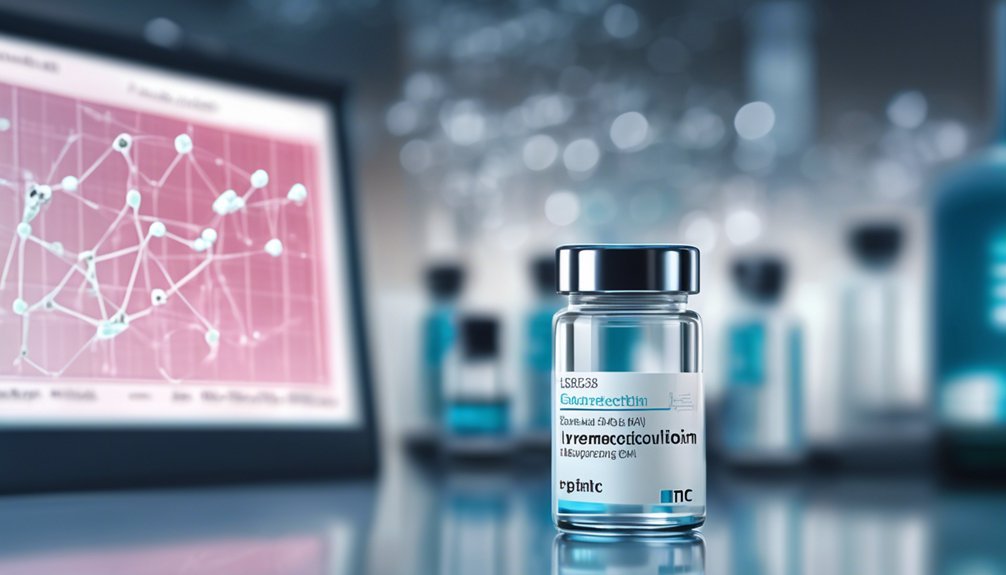You might think ivermectin is the miracle cure for cancer, but the reality is far more complex. As narratives around its potential benefits have evolved, a stark divide has emerged between hopeful claims and the rigor of scientific evidence. This discussion will unpack the timeline of ivermectin’s role in cancer discourse, revealing critical insights about the clash between anecdotal enthusiasm and the necessity for validated research. What does the future hold for this controversial treatment?
Key Takeaways
- Initial studies showed ivermectin’s potential to inhibit cancer cell growth, prompting discussions but requiring further scientific validation.
- Misinformation surrounding ivermectin surged, with exaggerated claims often overshadowing the need for robust evidence and critical analysis.
- Key publications reported positive outcomes in preclinical trials, yet many findings remain preliminary and lack rigorous testing.
- Scientific community critiques emphasize the importance of controlled trials, arguing that anecdotal evidence can mislead patients regarding treatment efficacy.
- Differentiating between anecdotal claims and peer-reviewed research is crucial for informed patient decisions and maintaining scientific integrity in cancer treatment.
The Emergence of Ivermectin in Cancer Discourse

In recent years, a growing number of discussions have emerged around the potential role of ivermectin in cancer treatment.
These emerging narratives challenge traditional cancer discourse, often blurring the lines between established therapies and alternative approaches. As you navigate this complex landscape, it’s crucial to consider the motivations behind these discussions.
Some advocate for ivermectin based on anecdotal evidence, while others emphasize the need for rigorous scientific validation. By critically engaging with these perspectives, you can better understand how ivermectin is positioned within the broader context of cancer treatment.
Advocates for ivermectin highlight anecdotal evidence, while critics call for scientific validation in the evolving landscape of cancer treatment.
This exploration not only impacts patient choices but also informs ongoing debates about the future of integrative oncology. Your awareness and understanding are essential in fostering informed conversations around this contentious subject.
Initial Scientific Studies and Findings
Emerging interest in ivermectin’s potential as a cancer treatment has prompted initial scientific investigations that warrant careful examination.
Early studies utilized various scientific methodologies to assess ivermectin’s effects on different cancer cell lines. Initial trials indicated some promise, revealing that ivermectin might inhibit cancer cell proliferation and induce apoptosis.
However, these findings were often preliminary and required further validation through rigorous testing. Researchers highlighted the importance of controlled environments and reproducible results to ensure accuracy.
As you explore these studies, it’s essential to recognize both their contributions and limitations. Understanding the scientific foundations can help you discern credible information from exaggerated claims, ultimately serving the broader community in the quest for effective cancer therapies.
The Rise of Misinformation and Misinterpretation
As researchers explore ivermectin’s potential in cancer treatment, misinformation and misinterpretation have surged, complicating public understanding. This misinformation spread can lead to narrative distortion, obscuring the actual scientific discourse.
You might notice several key factors contributing to this phenomenon:
- Overzealous claims without robust evidence.
- Misleading headlines that exaggerate findings.
- Social media amplifying unverified information.
- Confusion stemming from poorly designed studies.
These elements can mislead patients and healthcare providers alike, resulting in misguided beliefs about ivermectin’s efficacy.
As a community focused on serving others, it’s essential to promote accurate information and encourage critical thinking. By emphasizing evidence-based science, you can help counteract the negative effects of misinformation and foster a clearer understanding of potential cancer treatments.
Key Publications Supporting Ivermectin’s Efficacy

Amid the haze of misinformation, several key publications have emerged, showcasing ivermectin’s potential efficacy in cancer treatment.
Research has highlighted various ivermectin mechanisms, including its ability to inhibit cancer cell proliferation and induce apoptosis in specific tumor types.
Notably, clinical trials have tested ivermectin in combination with standard therapies, revealing promising results in enhancing treatment responses.
For instance, a recent trial demonstrated improved outcomes in patients with certain malignancies, suggesting a synergistic effect when combined with established drugs.
These findings contribute to a growing body of evidence that warrants further investigation.
As you explore this landscape, it’s crucial to differentiate between anecdotal claims and scientifically-backed research to ensure informed discussions about ivermectin’s role in oncology.
Social Media’s Role in Shaping Public Opinion
While social media platforms have transformed how we share and access information, they also play a significant role in shaping public opinion about health topics, including the use of ivermectin in cancer treatment.
The social media influence on public perception can lead to both positive and negative outcomes:
- Rapid dissemination of information can raise awareness about treatment options.
- Misinformation can mislead individuals about ivermectin’s efficacy.
- Online communities may foster support for patients exploring alternative treatments.
- Influencers can sway opinions, often without scientific backing.
As you navigate these platforms, it’s crucial to critically evaluate the content you encounter.
Understanding how social media shapes perceptions can empower you to make informed decisions and encourage others to seek reliable, science-based information regarding health treatments.
Counterarguments From the Scientific Community
Although many patients and advocates promote ivermectin as a potential cancer treatment, the scientific community raises significant counterarguments based on a lack of rigorous evidence supporting its efficacy.
Critics emphasize that claims surrounding ivermectin often stem from anecdotal reports rather than controlled clinical trials. This absence of data undermines scientific integrity and raises concerns about misrepresenting evidence based medicine.
Critics highlight that ivermectin claims often rely on anecdotal evidence, lacking the support of controlled clinical trials.
Furthermore, established treatment protocols rely on thorough research and peer-reviewed studies, which ivermectin currently lacks in the cancer context. Many researchers urge caution, arguing that promoting unproven therapies can divert patients from effective treatments, potentially compromising their health.
It’s vital to prioritize evidence-based approaches to ensure patients receive the most reliable and effective care possible.
Regulatory Responses and Public Health Implications

Regulatory bodies have responded to the rising interest in ivermectin as a cancer treatment by emphasizing the need for stringent evaluation of its safety and efficacy. They focus on balancing innovation with public health policies to ensure patient safety.
Key aspects include:
- Reviewing existing regulatory frameworks for drug approval.
- Promoting transparency in research findings and clinical trials.
- Engaging with the scientific community to address misinformation.
- Encouraging collaborative efforts among stakeholders in healthcare.
These actions aim to prevent the misuse of ivermectin and highlight the importance of evidence-based treatments.
The Future of Ivermectin Research in Oncology
As researchers continue to explore the potential of ivermectin in oncology, the landscape of cancer treatment may undergo significant transformation.
Future directions in this field hinge on robust clinical trials that assess ivermectin’s therapeutic potential. Increased research funding will be crucial to support these trials and enhance evidence synthesis to inform treatment protocols.
Collaborative studies among institutions can further enrich our understanding and expedite findings. Ensuring patient access to promising therapies remains a priority, as equitable distribution can impact overall outcomes.
Frequently Asked Questions
What Are the Common Side Effects of Ivermectin in Cancer Patients?
When considering ivermectin toxicity during cancer treatment, you might notice common side effects like nausea, diarrhea, dizziness, or skin rash. Monitoring these reactions is crucial to ensure effective and safe management of your treatment plan.
How Does Ivermectin Interact With Standard Cancer Treatments?
Imagine combining therapies with unexpected results. Ivermectin interacts with standard cancer treatments through its unique mechanisms, potentially enhancing effectiveness or altering responses. Understanding these interactions can guide better patient care and treatment strategies.
Are There Any Ongoing Clinical Trials for Ivermectin and Cancer?
Yes, there are ongoing clinical trials investigating ivermectin’s efficacy in cancer treatment. For the latest clinical trial updates, you should check reliable medical databases or clinical trial registries to stay informed and support your community effectively.
What Role Do Patient Testimonials Play in Ivermectin Discussions?
Patient testimonials often provide anecdotal evidence that can influence perceptions of ivermectin’s effectiveness. While these experiences can be compelling, they’re not substitutes for rigorous scientific research, and it’s vital to consider them critically when evaluating treatment options.
How Can Misinformation About Ivermectin Be Effectively Countered?
To effectively counter misinformation about ivermectin, you can employ fact-checking strategies and advocate for social media regulation. These approaches help ensure accurate information circulates, fostering informed discussions and protecting public health from misleading narratives.
Conclusion
In navigating the complex landscape of ivermectin and cancer, you’ll find a web of enthusiasm and skepticism. While some studies hint at potential benefits, rigorous research and controlled trials remain essential for clarity. You must differentiate between anecdotal claims and validated science. As regulatory responses evolve and misinformation persists, the future of ivermectin in oncology will depend on evidence, scrutiny, and an unwavering commitment to scientific integrity. Your understanding shapes the conversation moving forward.




